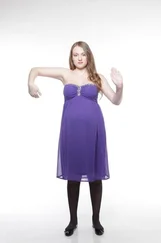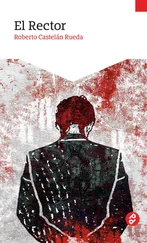“They’re giving me antibiotics,” said Mandy. “I had a fever an hour ago. You know that the doctor has already gone back to Germany? I don’t know why he’s in such a hurry.”
“Another operation, what do you think,” said Lirit. “The only thing that interests them is money. You’re acting not quite normally.”
“Yes, I feel a little strange too. Vo-mi-ting dish!” yelled Mandy.
“Mommy!” cried Lirit and she leaped for the kidney-shaped green dish.
“Here, here it is. .” Lirit brought the dish to Mandy’s mouth.
Mandy succeeded in raising herself a little while mumbling in ex-Rhodesian English, and vomited all the liquids. Then she closed her eyes.
“They gave me too much anesthetic. Disgusting.”
The patient fell back onto her stomach with the help of her daughter, moaning all the time:
“Ai, ai, ai. .”
Without opening her eyes and with great difficulty she said to herself:
“I want to wear bare-backed dresses again. . but it hurts so much. Never mind. . it will pass. . it’s not a disease, it’s only plastic surgery.”
And to Lirit she said, “You understand, darling Lirit, I couldn’t bear having my shoulder blades rubbed out and a back as flat as a plate with a canal for a spine. I said to myself, forget the spine, but the shoulder blades! I couldn’t take it. And now look what a position I’m stuck in. .”
Tears poured from her eyes and were absorbed straight into the white sheet, on which was written in decorative Hebrew letters: Medical Frontline.
“In two days’ time I’ll be allowed to get up, to lie on my back. Everything will be all right,” she consoled herself. “Come here a minute, Liritkeleh, help me, dear. I want to turn my head to the other side. It’s hard, it hurts, but I’m sick of having it on the same side all the time. All I need are bedsores on my face!”
As gently as she could, but with a little sting of malice, her daughter said:
“Mother, you have to flow with time. To accept the change.”
“When you grow up, you accept the change,” muttered Mandy.
“But you have to. It’s stupid to fight the wheels of time. .”
“How’s Dael?” cried Mandy suddenly and stretched a tiny bit, because of the pain. It was only now that she remembered this worry. “Was there any exchange of fire mentioned on the news? Did they say an Israeli was killed in the shooting, his family not yet notified?”
“Everything’s fine, I spoke to him fifteen minutes ago.”
“Thank God,” said Mandy. “That’s what I feared the most. I’m under the anesthetic, and something happens to him.”
Lirit thought: What difference does it make if she’s anesthetized when something happens to him? What’s she missing that’s so urgent for her to know?
“What about your father?” Mandy sighed again.
“He’s probably still up in the sky,” said Lirit and looked at her mother lying on her stomach as helpless as an overturned tortoise. There was a lot of compassion in the daughter’s look. And on the other hand, to be on the safe side, she thanked God that she was still young with her whole life before her, and not like her mother who was buried in a pajama factory. She, whatever her situation in life might be, still had a lot of opportunities!
BAHAT MCPHEE WAS AN ABSENTMINDED WOMAN, WHICH led to deficiencies in her orientation in space. In her late forties the condition worsened, to such an extent that she would lose her car even when she parked it outside the underground parking lots she hated. Not long ago she had lost it when she parked (by mistake) two streets away from her home, since the parking space reserved for her was occupied, and it never occurred to her to appeal to the authorities.
One day, in the middle of searching for her car in minus four of the underground parking lot, McPhee had a revelation. She understood that people’s terror of death was a post-traumatic phenomenon. Death was so terrible that their minds consented to remembering only the fear they experienced when it happened, and not the event itself.
McPhee knew that difficult and central events in a person’s life were erased from the center of the memory and stationed like soldiers on the periphery, in the margins of the margins, to keep them from returning and upsetting people again. She too had black holes in her memory, and perhaps they were responsible for the damage to her orientation in space.
During the same revelation on minus four, row seventeen, the professor of zoology also understood that we were not given souls in order to wax lyrical on the fear of their extinction and the difficulties of life. She knew nature, this wasn’t how it behaved. In nature nothing got lost. Including the soul. She noticed that while she found it difficult to believe in the existence of God, she could really connect to the Divine Presence.
Armed with these insights Bahat McPhee began to study at Hebrew Union College, at first on the Internet, and later also on short trips to New York.
She was a very lonely, bitter woman, and it was to be expected that the Divine Presence would send her revelations from time to time. Most of the hours of the day she spent in her lab, riveted to the golden silk webs and their manufacturers, the Nephila maculata .
Recently, with the lack of significant progress in her research, the prestigious Cornell University had brought in a Hispanic bio-physicist residing in Ithaca, fifteen years younger than she was, named Mario Salazar. During the first two weeks a passionate love affair broke out between the two, but it quickly petered out. To the credit of the participants in the lightning romance, let it be said that they did not suffer from mutual rejection after the storm subsided, but became practical, concentrated, brisk, and the research which had previously faltered suddenly charged full steam ahead, with results she was happy to pass on to the Israeli inventor.
MCPHEE WAS BORN in Israel, in the green suburb of Ramat Aviv, in the small Shimoni Street, leading off the big Reading Street. She lived in with her parents, Reudor and Madeleine Segal, and her arachnophobic sister, Shoham, in a two-and-a-half-roomed ground-floor apartment.
At the end of the sixties, when she was twelve, the family went to San Francisco as emissaries on behalf of the state. Reudor Segal was a senior civil servant.
In San Francisco the Segals settled down for two years in a lovely apartment on a hill, not far from Chinatown. From the windows the two sisters, sweet Bahat and Shoham, looked out at the Golden Gate Bridge and tried to guess the meaning of the elusive landscape on the other side of the river.
During this period their parents were caught up in the beatnik revolution, and in the framework of their search for the right way of life, they became acquainted with Shivananda Yoga, after which they were never the same.
At the end of his mission the state fired Reudor, due to budget cuts, and he sank into unemployment and depression. He even started to talk about divorce. Madeleine, who was at her wit’s end in trying to prevent the melancholy Reudor from leaving her with two children and a bit of lawn adjoining the front porch, suggested that okay, he could start proceedings that would end in divorce, but in the meantime they should practice yoga on the aforementioned strip of lawn. The yoga brought them together, and they improved from day to day. After a few months they even started to give lessons privately, on the lawn and inside the house, and afterward they got permission to work in the Shimoni Street air-raid shelter, because luckily for them there wasn’t a war at the time. They taught five days a week and stopped talking about getting divorced. About a year after Reudor lost his job, their financial situation stabilized and they opened the first yoga school of its kind, which they called Splendor on the Lawn. The school had dozens of students. Some of them preferred her, and others preferred him, but there was no jealousy between them, only harmony, and it seemed that they had reached safe harbors, at least for the time being.
Читать дальше












